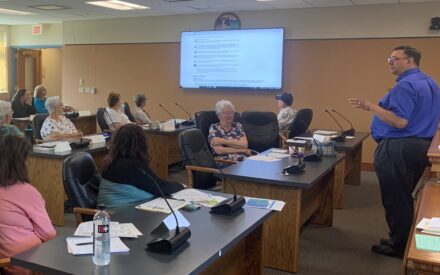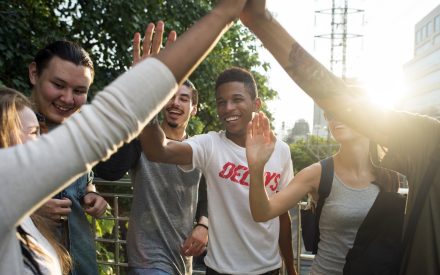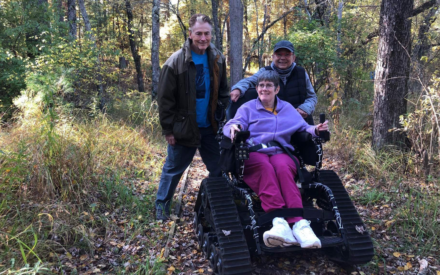Extension helps older people build social connections by creating opportunities for people to learn, share and grow together. Allowing space for participants to share meaningful conversation and life experience with one another builds relationships, individual confidence and encourages social connection. When older people are socially connected to others and their community, they have a better overall quality of life and reduces the need to rely on healthcare systems.
Older people are more likely to experience social isolation and loneliness, as they often experience losses of family, friends, or spouses; live alone; or have chronic health issues that isolate them in their homes. Immigrants, LGBTQ+ people, minorities, victims of elder abuse, and adults living with disabilities have an even greater risk of developing social isolation and loneliness.
Extension creates spaces for and facilitates connections between older adults through our Wise Wisconsin series, Aging Mastery Program, and StrongBodies program. On a broader scale, Extension is a core member of the Wisconsin Coalition to End Social Isolation and Loneliness, leading collaborative efforts to identify older people facing social isolation and loneliness and to provide older people with resources and places to make meaningful social connections.
“You’re never too old to learn, and I always learn at least one new thing at these sessions. It’s great to be with other people, and I met a few new people who have relatives that I know — small world!”
A Wise Wisconsin Participant in Kewaunee County shares their new social connection
Creating Spaces For Older People to Connect
The Wise Wisconsin Virtual Learning series launched in 2021 to provide knowledge and resources on topics that help participants enrich their lives while learning from others and sharing their own experiences to build a sense of connection to others virtually. Topics like finding joy, compassion resilience, and retirement transitions increase participants’ knowledge and skills around self-care techniques and social connection. This is the first, and only, program that Extension developed with the goal of increasing social connection. Wise Wisconsin focuses on issues that people face later in life and attracts mostly older participants or professionals that work with older people.
Offered twice in 2021 and once in 2022, 709 participants registered for the live Series and/or registered to receive the archived recordings, and the archived videos had 1227 views. Of those that attended or viewed and submitted the post-survey, 88% of participants indicated they felt more socially connected to others because of the program and felt they received the skills and knowledge to connect more with others. One participant said, “This helps me so much to have these virtual classes. They are social as well as informative, and I need that at this challenging time.”
The Aging Mastery Program and StrongBodies program also measure social connection as secondary outcomes. Since 2021, 42 Aging Mastery Program workshops provided 499 participants with aging resources, resulting in 88% of participants feeling the program helped them improve their social or community connections. In 2022, 67% of 1326 StrongBodies participants said they felt more connected to other people since participating in the program, and 63% felt they received knowledge and skills to be more connected to others after participating. One participant noted, ”[The Aging Mastery Program] was certainly an enjoyable and informative series. I am happy to be able to use many of the good ideas. It’s never too late to learn!”
Improving Screening Processes for Social Isolation and Loneliness
While supporting direct programmatic efforts, Extension is also a core member of the Wisconsin Coalition to End Social Isolation and Loneliness. Extension collaborated with state-level partners to pilot a process for local agencies to screen, identify, and refer individuals that are isolated or lonely.
Six agencies serving older people or people living with a physical or cognitive disability screened 96 individuals for social isolation and loneliness using the UCLA 3-Item Social Isolation and Loneliness screening tool. The pilot effectively identified 40 of the 96 participants as socially isolated or lonely. In 46% of all cases, the interviewer provided resources or next steps to the individuals that screened. These are people that would not have otherwise been given resources to address social isolation and loneliness. The pilot project will inform agencies across the State on the process of implementing the screening within their own communities.
Gathering evidence that Extension programs increase social connection allows us to share these impacts with providers; health and aging coalitions; and local partners serving older people, marginalized populations, and others at higher risk for social isolation and loneliness. In turn, they better serve these individuals by referring them to programs that help people connect with others. When older people are resourced and connected, they can rely less on healthcare systems and enjoy a higher quality of life.
Download Article

 Food Entrepreneurship Ecosystem Development, Education, and Evaluation
Food Entrepreneurship Ecosystem Development, Education, and Evaluation Coastal Training Program Meets the Needs of Lake Superior Decision Makers
Coastal Training Program Meets the Needs of Lake Superior Decision Makers Supporting Youth Mental Health and Well-Being
Supporting Youth Mental Health and Well-Being Upham Woods Accessible Bird Events: Increasing Inclusion in the Outdoors
Upham Woods Accessible Bird Events: Increasing Inclusion in the Outdoors


